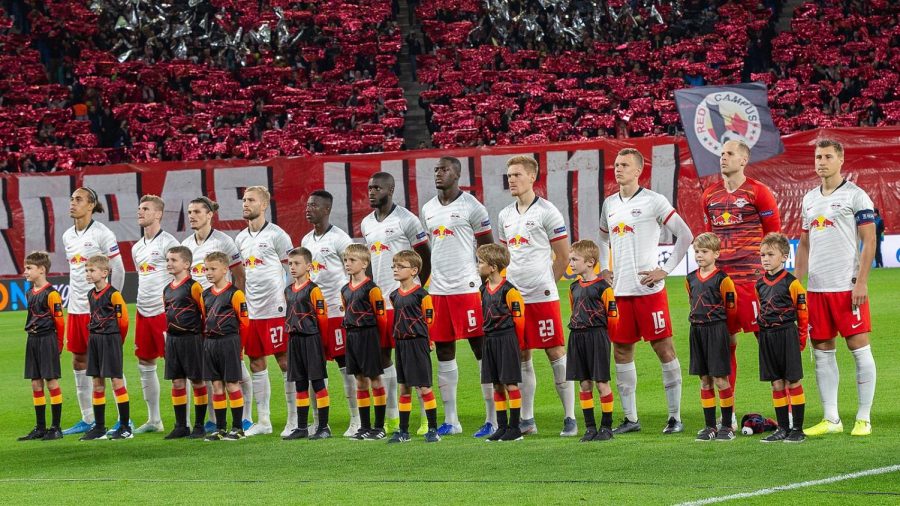The story of RB Leipzig
March 6, 2021
Boasting the highest average attendance of any soccer league, passionate fans and surprisingly low ticket prices, the Bundesliga, the top soccer league in Germany is among the most revered in the world.
An emerging team in the league is RasenBallsport Leipzig, whose exciting play style and surprising run in the Champions League, a tournament that pits the best European soccer clubs from the top leagues against one another, has made it a club to keep an eye on. However, if you ask any Bundesliga fan for their thoughts on RB Leipzig, they’d most likely say it is a betrayal to German soccer.
Before 2009, a company simply buying a club was unheard of in top flight European soccer. Then Red Bull, who also owned other soccer clubs such as the New York Red Bulls, RB Salzburg in Austria, RB Brazil in Brazil and RB Ghana in Ghana, decided to take control of SSV Markranstädt, a weak team in the fifth division of German soccer with a dream of making it to the Bundesliga in less than eight years.
The team’s logo and uniforms were replaced with Red Bull’s, a stadium that could seat 43,000 was purchased in the city and the construction of a brand-new training facility was underway.
Not only did RB Leipzig reach the Bundesliga in its eighth season, it also reached the Champions League by the tenth.
Having the youngest squad in the Bundesliga, they are in a position to topple FC Bayern Munich and Borussia Dortmund, who have been the only two teams to win the league in the past decade.
Now, this begs the question: Why do Bundesliga fans dislike RB Leipzig so much? For starters, it’s how Red Bull has managed to snake their way into German soccer.
The 50+1 Rule by the Deutsche Fußball-Bund, the German Football Association, dictates that soccer clubs and their fans hold a majority of voting rights, meaning they have a say in the election of board members, including the club president. Under this rule, investors or companies cannot hold more than a 49%stake. As a consequence, private investors cannot take over a club and push it into a direction to seek higher profit, rather than appealing to the wishes of club fans.
In essence, this rule allows democracy to remain present in German soccer clubs and guards teams from reckless owners.
Red Bull made a mockery of this rule by purchasing 49% of its own shares in the club and issuing a few of them at exuberant prices to a select few individuals. They even managed to get around the rule against naming a team after a product.
The ‘RB’ in RB Leipzig actually stands for RasenBallsport, which is German for “sports played with a ball on a lawn.” Regardless, the club is known to everyone as Red Bull Leipzig, which, to be fair, was a brilliantly mischievous marketing move.
To add on, Red Bull is a very rich company generating more than $7 billion in 2019. This allows Leipzig to have access to top facilities and send talent scouts out to far off places, which very few soccer clubs in the world, let alone Germany, have the ability to do.
Red Bull can often transfer players within their clubs, which is what they did when they brought on Tyler Adams, a talented American player, from the New York Red Bulls to Leipzig.
Despite how young and inexperienced their players are, Leipzig have put together a very strong squad. Several of their talents have even gone on to join famous clubs, with the recent transfers of Dayot Upamecano to FC Bayern Munich and striker Timo Werner to Chelsea in the Premier League last year, making the already rich club earn $105.05 million.
As a result of all of this, there’s no love for the club in the Bundesliga.
The first time Leipzig visited Union Berlin for an away match, the page within the game program dedicated to the visiting club’s history was instead replaced with one that detailed how to breed bulls.
Another team, Fortuna Dusseldorf, updated its club laws to avoid playing friendlies against the club. Many rival fans avoid visiting the Red Bull Arena, Leipzig’s home stadium, and Leipzig are often met with crude banners from rivals when visiting for away games. Just goes to show how money can buy you trophies — but not respect.








Flo • Mar 7, 2021 at 4:41 pm
Great article! Very interesting